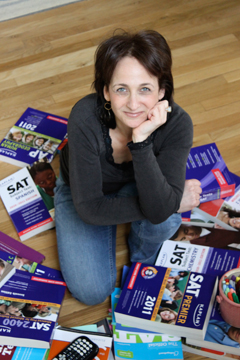Each month, Stier is trying out a new methodology or service. So far, she's taken College Board and Kaplan courses (in both online and in book formats). She's also tried watching Khan Academy videos. Next month, she's going to sign up for Grockit, and she plans to eventually hire individual tutoring services as well.
It's been almost 30 years since Stier first took the SAT, and even if her scores had once been stellar, time chips away at our test-taking skills and at our mastery of math and vocabulary. Having worked in the publishing industry, Stier wasn't too concerned about the latter. But brushing up on -- and learning -- the necessary material to ace the math portion of the test is another thing altogether.

She's teaching herself primarily, with some support from online material and books. And she has her son to help her too, she says.
True, she's learning a lot about her own knowledge and learning process. But that teaching and learning relationship with her son might be the most important lesson here.
"I have a weird understanding what he's going through," she says, noting that she's recognized how hard it is for him to carve out the time for studying, particularly after an already full day of school and homework. Describing her own limited "think hours," she says that the Perfect Score Project has given her a lot of insight into what teens have to go through in order to make time for something that is notoriously boring.
By going through the study process with her son, she says she's found a way to keep both of them motivated. They study together and run through practice tests together. They help each other troubleshoot wrong answers. Comparing scores on quizzes is akin to Scrabble she says, as the two of them engage in a friendly competition. "That's the most powerful message," she says, "work with your kid."
But as it's about her own quest for a perfect score on the SAT, Stier is paying attention to more than just studying alongside her son. Stier is monitoring her own learning and progress like a hawk. She's also able to recognize that she studies better with books and learns better when she handwrites things than she does with computer-mediated studying and test-taking.
Book: I'm Excited. Can't wait.
Online Video: Dread. Drudgery. How much longer does this go on.
One exception to the video versus book preference: When I need a solution, I don't feel the same "video dread." I'm happy to go in, learn what I need to, then leave.
She interviews herself about the experience.
Q. Does your son feel more pressure to get the perfect score now that you are doing this?
A. I wish. No, he doesn't. That said, he has become more interested in the SATs now that I've climbed into the trenches with him. In fact, he said to me last night "Mom, when can we do SAT work again?" (I swear to you. This is an honest to god quote from April 10, 2011)
Stier speaks out about unsatisfactory experiences with online test prep courses, for example, when teens would likely remain quiet.
You can't get to the answers until you finish the entire (and extremely long, I might add) "quiz." When you finally get the answers, they come without the questions. I realize that memory starts going in your 40s, but can anyone remember question #2 by the time they finish #50?
She's approaching all of this with a great deal of self-reflection, a depth of analysis and a list of demands that a teenager studying for the SATs would unlikely have.
So when she aces the SAT test -- and I'm sure she will -- it won't just be a matter of what Stier has mastered. It's also what the rest of us might be able to learn about the world of test prep as well.



